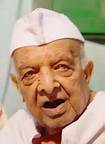It is a good fortune that Karnataka’s soil has been treaded by personalities known for their universal outlook and integrity. A melting pot for various languages, religion and culture, Karnataka had a number of persons belonging to Muslim community whose contribution to Karnataka’s secular traditions is immense. Historically we had Ibrahim Adilshah, the ruler of Bijapur whose work in Urdu, Kitab-e-Nauraspopularised Hindu music among the Muslims. Karnataka was the abode of Sufi saints like Baba Budan and Khwaja Bande Nawaz whose way of life and moral sermons inspired both Hindus and Muslims and paved way for Hindu-Muslim amity. In the 20thcentury there was another similar figure who was not only a symbol of Hindu-Muslim unity but also a freedom fighter, folklorist, singer, lyricist and a dramatist. He was the late Dr.S.K.Kareem Khan. Born in 1908 at Sakleshpur in Hassan district of Karnataka to an Afghan soldier, Abdur Rahman Khan, and his wife Jainabi, S.K.Kareem Khan studied classical Sanskrit and Kannada literature under Achangi Narayana Shastri of Sakleshpur and despite his informal education, mastered Sanskrit and Kannada.
As a Folk Singer: It was during his teens that Kareem Khan was attracted towards folk songs. His house at Sakaleshpur was a halting place for touring merchants selling brass and copper wares. After dinner they used to hum folk songs which young Kareem used to listen with rapt attention. Inspired by the call given by Mahatma Gandhi he Kareem Khan joined the freedom struggle and this took him to various places. This occasion gave him an opportunity to hear and chronicle folk songs which he came across and later he himself used folk as a medium to spread the message of the freedom. Later collecting and singing of folk songs became his life’s passion. He used to visit villages and standing under a platform or tree frequented by people used to sing folk songs. Mesmerised by his melodious voice people used to gather around him. At the end he used to urge the people to join the Congress party then involved in the country’s freedom struggle. He was jailed several times for his participation in the freedom movement. There his fellow jail inmates used to pester him to sing folk songs for them. Such was the sweet voice possessed by Kareem Khan.
Multi-faceted Personality: Kareem Khan’s was a multi-faceted personality. He penned screen play and song lyrics for Kannada films, wrote dramas, translated works from Sanskrit and Urdu to Kannada, was a researcher, essayist and a pioneer scholar in folklore studies. This apart he was fully involved in the country’s freedom struggle and Karnataka’s unification movement. During 1930s worked as an editor and sub editor of two publications Loka Mitra of Dharwad and Antharanga of Udupi. . In the early 1960s he launched `Janapada Prakashana’, an exclusive publication dedicated to folk literature, art and music; copies of which he sold at 50 paise each. Secularist to the core he led a simple life, true to the Gandhian principles which he cherished. Though he avoided power and publicity, such was his achievements that honours came in abundance. He was conferred the Janapadashri and Karnataka Rajyothsava awards by the government of Karnataka, Nadoja award by Hampi University, honorary doctorate from Gulbarga University and numerous other honours from various institutions and organisations. Given epithets like Janapada Jangama and Janapada Bheeshma, he was the President of Karnataka Janapada and Yakshagana Academy from 1987 to 1990. He passed away in Bangalore on 29th July 2006.
Modern Shishunala Sharif: It would be surprising to know that there is a lot similarity in the life and works of Santa Shishunala Sharif and Kareem Khan. Both were known for their simplicity and integrity. Both were secular in their outlook and had good knowledge of Hindu epics, traditions and culture. While Shishunala had Govindabhatta as his guru, Kareem Khan had Narayanashastry as his guru. While Shishunala was a mystic poet, Kareem Khan was a social activist cum folklorist. The composition of both these stalwarts will be evergreen in the minds of the Kannadigas.
source: http://www.karnatakahistory.blogspot.in / Home> Dr. S.K.Karim Khan / by S. Srinivas / May 22nd









